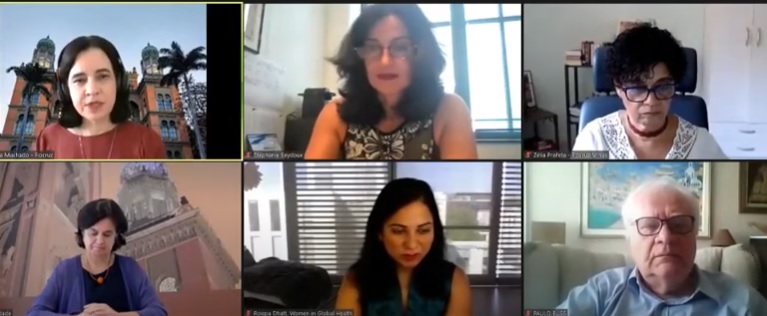Seminar discusses inequalities faced by women in global health
20/09/2021
Cristina Azevedo (Fiocruz News Agency)
Women are the majority in the healthcare workforce. Yet they are far from leadership positions, face unequal pay, and are often victims of bullying and sexual harassment. If the panorama described in the webinar Women in Global Health, promoted by the Fiocruz Global Health Center (Cris/Fiocruz) on the last 15th, seems bleak, it also brings foci of hope: at the same time that it exacerbated these inequalities, the COVID-19 pandemic shed light on them, broadening the debate around the theme and the search for solutions.
Coordinated by the Fiocruz vice-president of Education, Information and Communication (VPEIC), Cristiani Vieira Machado, the seminar included the participation of Roopa Dhatt, NGO Women in Global Health executive director; Stéphanie Seydoux, French ambassador for Global Health; Nísia Trindade Lima, Fiocruz president; and also with comments from Zélia Maria Profeta da Luz, researcher of the René Rachou Institute (IRR/Fiocruz Minas) and member of the World Health Organization (WHO) Council on the Economics of Health For All.
"According to data from the Economic Committee for Latin America and the Caribbean (ECLAC), women suffered more sharply from job retractions, especially in the informal sector, they were more burdened with domestic chores, with the closing of schools, and with family members who fell ill", Cristiani pointed out. "This scenario requires comprehensive public policies and collective action", she said, recalling that Fiocruz has a Pro-Gender and Race Equity Committee and is currently chaired by a woman.
"Blind politics"
Roopa Dhatt pointed out that many policies are "gender-blind", which reinforces discrimination. As an example, she cited measures taken during the lockdown that for some women meant leaving them in violent environments. In addition, at least 30% — in some cases up to 60% — of services for mothers have been discontinued or hindered in the pandemic.
If 70% of the healthcare workforce is made up of women, the same is not true in leadership positions, where they represent only 20%. "They are underrepresented, contained by racial factors, by coming from minorities, being migrants, the various disadvantages accumulate. There is a 28% gap in wages compared to men's. They also face sexual and psychological harassment, which can come from co-workers or patients," he said.
Together with the French government and WHO, WGH launched the Gender Equal Health and Care Workforce Initiative (GEHCWI), on four pillars: increasing presence in leadership positions, equal pay, protection against harassment, and better working conditions.
Triple Dividend

Ambassador Stéphanie Seydoux highlighted the Generation Equality Forum held in Paris two months ago, marking the Beijing Conference 26th anniversary. The idea was "to reject this trend of retreating from commitment to women's rights", she explained. Among the commitments made is the promise to make 40 million euros (R$ 247 million) available for the efforts. Commitment areas have been defined, such as against gender violence; economic rights; sexual and reproductive health; and innovation for gender equality.
On the health issue, the ambassador noted that "there is an urgent need to obtain broader commitments to increase the women in leadership positions proportion, recognize the unpaid care work value and the equal pay importance and protection from violence and harassment, as well as the ensure safe and decent working conditions. All this to achieve the Gender Triple Dividend."
Social Movements
It was up to Nísia to bring the discussion to Brazil. The Fiocruz president said that it is "revealing that the women participation in the Brazilian Academy of Sciences is in the 30% range. At Fiocruz, which is an institution that has this commitment, not only did we take 120 years to have a woman president, but today we are still 30% of the representation in the Deliberative Council, which is the institutes' board. These are data that show how much we have to move forward."
Nísia said that this agenda is central to the 9th Internal Congress preparation. She recalled that in 2017 a resolution dedicated to Race and Gender Equity was passed with a diversity vision, which also involves workers with disabilities. She also highlighted the program Girls and Women in Science, in which professionals from Fiocruz various areas receive students, with a view to social inclusion.
"When we talk about gender equity, we cannot fail to mention that it occurs differently, it is especially serious in relation to black women", she said. The Foundation has been working intensively with vulnerable populations in the country. In Rio, this occurs especially in the Manguinhos and Maré communities, where Fiocruz has integrated scientific knowledge, research, and community action. "We see well-structured movements, and we observe the women's strong presence. An agenda like the one we discussed here has to count on these women's protagonism."
Intersectionality
Zelia Profeta also highlighted the issue of intersectionality. "If we don't make this discussion thinking about gender, race, social class, and even generational, we may not make the relationships correctly", she said, citing research that shows that most nursing technicians and health agents are black and brown-skinned people.
About the work in the WHO board, the Fiocruz Minas former director told that "the idea is to have a plan at the end of two years that presents health for all, but in a perspective that health is not an expense, it is an investment. The council idea is to have health defining how the economy has to work, and not the other way around", she said. "I think the main challenge is to create an agenda that can advance, that can influence leaderships, and I think we have all the conditions to do that.


